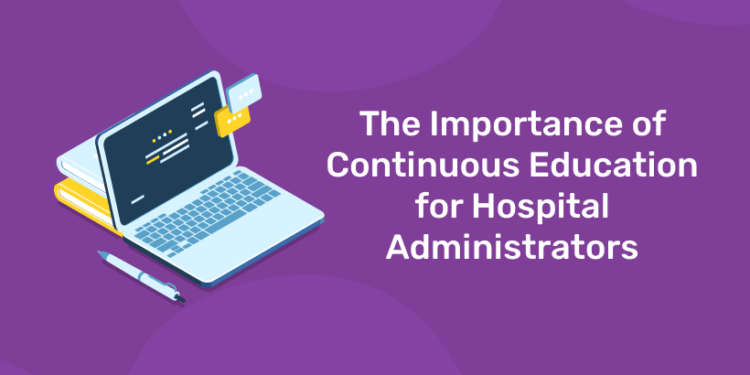Table of Contents
Continuous Education for Hospital Administrators is crucial in today’s rapidly evolving healthcare landscape. . As the gatekeepers of healthcare facilities, hospital administrators need to stay current with the latest knowledge, skills and industry trends to maintain high patient care and operational standards. This ongoing learning not only develops their skills but prepares them for the challenges of technological advancements, regulatory changes and patient expectations.
Explore Your Future in Healthcare Management! Enroll now
The Need for Continuous Education and Professional Development
Keeping Up with Technological Advancements
Healthcare is adopting new technologies fast – electronic health records (EHR), telemedicine and artificial intelligence. Hospital administrators need to understand the implications of these technologies for clinical operations, patient data management and overall healthcare delivery. Continuing education ensures administrators have the knowledge to implement these technologies effectively and make informed decisions that benefit patient care.
Adapting to Regulatory Changes
Healthcare is one of the most regulated industries with policies and regulations changing frequently to improve patient safety and care standards. Hospital administrators need to stay up to date with these changes to avoid legal and financial consequences. Continuing education programs often include updates on regulatory requirements to help administrators navigate the complex healthcare environment.
Developing Leadership and Management Skills
Good hospital administration requires a mix of leadership and management skills. Continuing education programs offer the opportunity to develop these skills through courses on leadership, strategic planning, financial management and human resources. By developing their skills administrators can lead their teams better, improve staff morale and keep the hospital running smoothly.
Patient Care and Satisfaction
Ultimately any healthcare facility’s goal is to deliver high quality patient care. Continuing education gives hospital administrators the latest best practice, quality improvement strategies and patient safety protocols. By staying current with healthcare delivery administrators can implement changes that improve patient outcomes and satisfaction.
Strategies for Continuous Education for Hospital Administrators
1: What is the primary role of a hospital administrator?
Online Courses and Certifications
Online education is now a convenient and flexible option for hospital administrators to continue learning. Many reputable institutions offer online courses and certifications in healthcare administration, leadership and management. These programs allow administrators to learn at their own pace while they juggle work responsibilities.
Entri’s Hospital and Healthcare Administration Course: Entri offers a comprehensive Hospital and Healthcare Administration Course designed to equip administrators with the latest knowledge and skills. This course covers essential topics such as healthcare management, regulatory compliance, and leadership strategies. Enroll now to stay ahead in your career and ensure your hospital operates at its best.
Professional Associations and Conferences
Being part of professional associations and attending industry conferences gives hospital administrators opportunities to network and stay current on industry trends. Associations like the American College of Healthcare Executives (ACHE) offer continuing education, certifications and events to keep administrators up to date on what’s new and what works.
Workshops and Seminars
Workshops and seminars provide hands on learning and the chance to meet experts in the field. These events are often focused on specific topics like healthcare finance, quality improvement and risk management. Participating in workshops and seminars allows administrators to go deeper and apply what they learn to their own work environment.
Mentorship and Peer Learning
Mentorship programs and peer learning provides hospital administrators with one on one guidance and support. Experienced mentors can offer advice on career development, leadership challenges and management strategies. Engaging with peers allows administrators to share experiences, discuss challenges and learn from each other’s successes and failures.
Explore Your Future in Healthcare Management! Enroll now
Hospital Administration Course with Assured Career Growth
Hospital Administration Course by Entri App: Master essential healthcare management skills, gain certification, and secure top roles in leading hospitals
Join Now!Benefits of Continuing Education for Hospital Administrators
Enhanced Professional Competence
Continuing education ensures hospital administrators are competent and confident in their role. Staying current with the latest knowledge and skills allows administrators to manage their responsibilities, make informed decisions and lead their teams with confidence.
Career Advancement
Continuing education can lead to career advancement opportunities. Administrators who pursue advanced degrees, certifications and specialized training are considered for higher level positions and leadership roles within the healthcare organization.
Better Hospital Performance
Hospitals with educated administrators perform better in operational efficiency, patient care quality and financial management. Continuing education allows administrators to implement best practices, streamline processes and improve overall hospital performance.
Job Satisfaction
Administrators who continue to educate themselves often experience higher job satisfaction. The opportunity to learn and grow professionally gives a sense of accomplishment and fulfillment. Plus staying current with industry trends and advancements makes the work environment more fun.
Overcoming Barriers to Continuous Education
Time Constraints
One of the biggest barriers to continuing education for hospital administrators is time. Balancing professional responsibilities with personal commitments can be tough. But online courses and flexible learning options can help administrators manage their time and continue to educate without compromising their work-life balance.
Financial Considerations
Cost can be a big barrier to continuing education. Many educational programs, certifications and conferences require financial investment. To overcome this administrators can look for scholarship opportunities, employer sponsored education programs and free or low cost online resources. Continuing education should be seen as a long term investment in career growth and hospital success.
Access to Resources
Resources for education can vary by location and institutional support. Administrators in rural or remote areas may have limited access to quality education programs. Organizations can partner with educational institutions to provide training and development opportunities for their administrators.
Explore Your Future in Healthcare Management! Enroll now
Conclusion
Continuous education for hospital administrators is essential for maintaining high standards of patient care, operational efficiency, and effective leadership. By staying updated with the latest knowledge, skills, and industry trends, administrators can navigate the complexities of the healthcare landscape and drive their organizations towards success. Investing in continuous education not only benefits administrators personally but also contributes to the overall improvement of hospital performance and patient outcomes.
By embracing continuous education, hospital administrators can lead their teams with confidence, implement best practices, and ensure their organizations thrive in an ever-changing healthcare environment.
Hospital Administration Course with Assured Career Growth
Hospital Administration Course by Entri App: Master essential healthcare management skills, gain certification, and secure top roles in leading hospitals
Join Now!Frequently Asked Questions
Why is continuous education important for hospital administrators?
Continuous education ensures hospital administrators stay updated with the latest knowledge, skills, and industry trends, which is essential for maintaining high standards of patient care and operational efficiency.
What are the benefits of continuous education for hospital administrators?
Continuous education enhances professional competence, opens career advancement opportunities, improves hospital performance, and increases job satisfaction.
How can hospital administrators overcome barriers to continuous education?
Time constraints can be managed with flexible online courses, financial considerations can be addressed through scholarships and employer-sponsored programs, and access to resources can be improved through collaborations with educational institutions.
How does continuous education impact patient care and satisfaction?
Continuous education empowers hospital administrators with the latest best practices, quality improvement strategies, and patient safety protocols, leading to enhanced patient outcomes and satisfaction.
Where can hospital administrators find continuous education opportunities?
Continuous education opportunities can be found through online courses, professional organizations, industry conferences, workshops, seminars, and mentorship programs.












